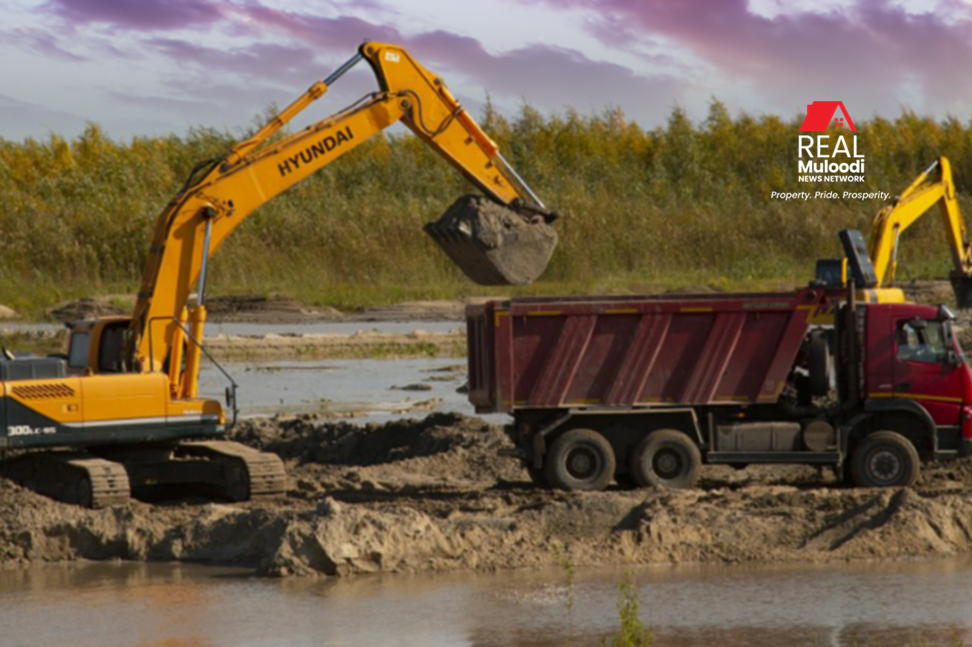UGANDA, Bugolobi | Real Muloodi News | Kampala Capital City Authority (KCCA) has forbidden Majestic Commodities, a private company, from building residential units in a portion of the Nakivubo wetland to prevent flooding in Bugolobi.
“The purpose of this communication therefore is to serve you notice to immediately halt the backfill and construction works being undertaken on Plots 1-5 Mpanga Drive and 67,69,71,73-81 Mpanga Close, Bugolobi until such a time that aforementioned public drainage and road works are completed to the satisfaction of the authority, then shall you proceed with the implementation of the new developments as approved,” KCCA’s Deputy Executive Director Eng David Ssali Luyimbazi wrote to Majestic Commodities on November 14.
The National Environmental Management Authority (NEMA) threatened Majestic Commodities with a USh500 billion lawsuit after the government agency suspended the civil works in the Nakivubo wetland in October.
Luyimbazi said the “current backfilling works of the wetland in the absence of an alternative drainage system in place, has not only caused public outcry but it has also exacerbated the poor drainage problem and flooding we are experiencing as a city.”
The wetland (Bugolobi part) was originally given a title by the government on April 1, 1987, and it was given to East African Clay Products before being given to Nyumba ya Chuma on April 15, 1989.
The land was the focus of Constitutional Petition number 13 of 2010, which established the Uganda Land Commission (ULC) as the legal owner.
On March 2, 2010, Nextel Ltd. received the aforementioned land from ULC, and on October 27, 2010, Majestic Commodities Ltd. received it.
On June 7, 2017, the government, acting on the advice of the Policy Committee on Environment, exempted the aforementioned land and the nearby UBC land from any title cancellation because they were titled before wetlands were protected by the Constitution in 1995.
On May 25, 2011, Majestic Commodities received a certificate from NEMA with the designation NEMA/EIA/3730 for the construction of warehouses. On March 22, 2021, the former NEMA Executive Director, Tom Okello Odong, issued a new certificate with the designation NEMA/EIA/14682 for the construction of residential homes.
Nevertheless, Luyimbazi claimed that despite NEMA’s communication about a cabinet decision stating that the aforementioned plots, which were formerly registered as Plot M468 Mpanga Close, were exempt under the Court of Appeal ruling, the same communication directed that the plots be “subject to biodiversity offset criteria and that the use of the said land be limited for essential and public services such as water works, ports, roads, and electricity lines.”
Majestic Commodities was also obliged by NEMA to create a sufficient buffer for water drainage, apply the drainage masterplan for the region at all times, and handle runoff from new projects to prevent silting of the wetland beneath the allowed development area.
Majestic Commodities planned to construct nine flats on three storeys in Nakivubo wetland.
However, Luyimbazi informed the business that several prerequisites must be satisfied before it could “proceed to carry out any building operations.” These include a thorough drainage design for the region under KCCA’s drainage masterplan for the catchment area, a sufficient and well-defined buffer, and the building of the anticipated road around the property (Mpanga Drive).
Residents of Bugolobi may now breathe a sigh of relief after watching helplessly as large trucks dumped mountains of murram into the wetland.
Since moving to Bugolobi in 1990, James Okello, 57, remarked “KCCA’s decision will energize us to even fight harder to protect our community from floods and other effects of poor drainage.”
33-year-old Bugolobi resident Grace Nakamatte stated “Government needs to take up this matter very seriously because climate change is real. The destruction of the wetland will subject our homes to flash floods. Our wellbeing should not be sacrificed at the altar of private developments.”
The Nakivubo wetland is a vital component of Kampala’s drainage system. There are eight major watersheds in this system, including the Nakivubo, Lubigi, Nalukolongo, Kasanga, and Mayanja/Kaliddubi.
All of these drainage systems in the Kampala and Metropolitan Area follow the terrain’s natural flow until they reach the catchment’s lowest point.
Kampala’s mountainous environment suggests that water swiftly flows into major and secondary canals at the lowest points from catchment regions (or in the valleys). Bugolobi is on the lower side of Kampala.
“We are already facing floods as a result of the construction of Village Mall and Shell Bugolobi on the original drainage,” said Moses Kabango, 47, a resident of Bugolobi.
Kabango added, “The encroachment on the wetland will turn Bugolobi into a disaster.”
Due to the modest diversion drains that the two developers (Village Mall and Shell Bugolobi) built being unable to handle the storm-water flow in this region, the Luthuli-Bandali rise is already a significant flooding point.
Floods have wreaked havoc, destroyed houses and commercial premises, damaged infrastructure (such as drainage systems, roads, and powerlines), and seriously disrupted Kampala’s traffic and economic activity.
The majority of those in danger of flooding reside and work in low-lying communities like Bugolobi. Several deaths in fallen buildings and drownings in runoff from flooding have been reported recently.
The government should expedite the process of revoking all land titles in wetlands, according to a recommendation made by a parliamentary investigation into Kampala’s never-ending floods.
The investigation by the Parliament shows that improvements made to wetlands in places like Kinawataka, Kyambogo Industrial Area, and Nalukolongo, among others, were to blame for Kampala’s perpetual flooding and inadequate drainage.
READ MORE LIKE THIS:



